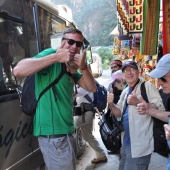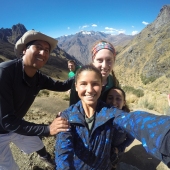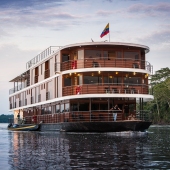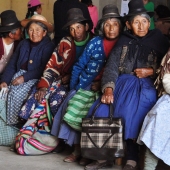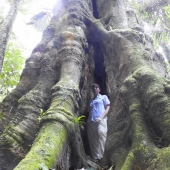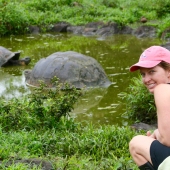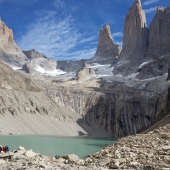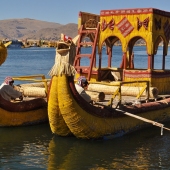Peru: life in the Andean lodge (part 8)
(continued from "Peru Comfort Food" part 7)
After you've been sick for a while, you get weak and shakey. The first thing to do was to get my son to stand, then walk, then exit the hotel without falling down the stairs. (no elevator) We made it to a local cafe, ate a little toast and drank some tea, then headed back to the hotel to get ready for the trip up the mountain.
You have to understand we were already "in" the mountains in Chota, but we would leave the "comfort" of the town (including that incredible vegetarian restaurant) to go farther up into the mountains. A 4-wheel drive truck showed up at the hotel and we put my son in the front passenger seat so he could at least pretend it was more comfortable. He seemed fragile and I knew being jumbled around like a tennis shoe in a clothes dryer would not be a pleasant experience for him after what he had been through.
We made several stops in town to pick up items for people living in the mountains before we finally headed out of town. The young men who drive this "road" (a term I use loosely), seem to do it as a money-earning enterprise. People hitch in and out of the back of the small trucks as they make their way up and down the mountain daily, and coins pass back and forth between the drivers and passengers.
I figured it must be the same with regards to the errand-running as well. "Hey Juan, can you stop at the ironworks and pick up my special order?" The interiors of these trucks were decorated like my grandmother used to decorate her parlor. Lots of tchotchkes and fuzzy things on the dashboard with tons of dangly things hanging from the rear-view mirror. I just prayed my son would not puke on any of it.
Every time the truck lurched badly on one side or the other (which was about every 9 seconds) I saw my son's face wince. I knew his insides were tender and this would be a rough ride. It took more than an hour to cover the 12 km and when we arrived, we still had to hike from the road to the lodge. We finally came to our stop and while the housekeeper carried up the groceries, I carried all my gear and my son's.
Somewhere I found the strength. It's like the story of the mom who lifts the car off her kid after an accident. You just do what you have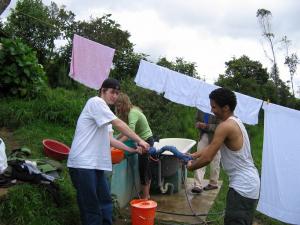 to do. So I did. The rest of our group was happy to see us and we moved in to our rooms. My son got a private room so he could rest and I joined the other teacher and our one girl student. (was she a trooper to travel with 6 boys, or what?)
to do. So I did. The rest of our group was happy to see us and we moved in to our rooms. My son got a private room so he could rest and I joined the other teacher and our one girl student. (was she a trooper to travel with 6 boys, or what?)
The housekeeper seemed attentive to the special dietary needs of my son and asked me what to bring for him. Tea is a Peruvian staple, so I also asked for bananas, rice and yogurt. The lodge was perched on the edge of nothing. There were no mailboxes or addresses. Nothing but grass, a cow or two, sparsely spaced mud-brick homes and the sky.
This wasn't like the U.S. where you go to a really big national park to see nature. People lived here. It was "normal" to be part of the eco-system. This was not a place you visited, it was a place you lived. There were no stores and no plumbing, although we did see a few electric wires. We were the only foreigners for miles and miles.
Peruvian families lived in one side of the lodge, so we saw local people parading by on foot all the time. The locals walked everywhere and it was common to see one person or a small cluster of people strolling around. Their paths criss-crossed the mountain as they conducted their business. The lodge was an "L" shaped, two-story oasis in the mountains. It had gravity-flushing toilets and there was hot water at certain times of the day. There was plenty of space to hand-wash our clothes and we could lounge on the wrap-around upper porch that had the most incredible million-dollar view I'd ever seen (This was before I visited Amantani Island on Lake Titicaca). (continue to part 9)
But there was one really interesting characteristic about the lodge that made it unique for us. The doors and ceilings were very low. My 6' 8" son could not stand up in his room. He had to step through the heavy wooden doors like a sailor on a submarine. Once inside, he stayed hunched over. He looked like a giant in the land of gnomes. It was cute for about 2-3 hours, then it became a headache to remember not to stand up inside. Even I had to duck to get through doorways, but at least I could stand up once inside the rooms.
My son sat on the porch to heal and watched the rest of us go about our business. The housekeeper brought trays of hot tea and popcorn and we sat around until it was time to hike to the different homes in the area where we would build mud-brick stoves. Life was slow, easy and comfortable. Finally. (continue to part 9)


